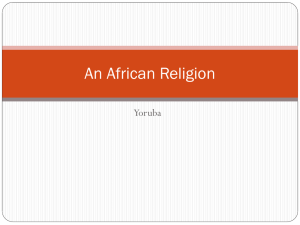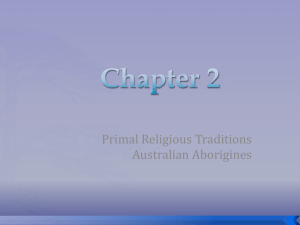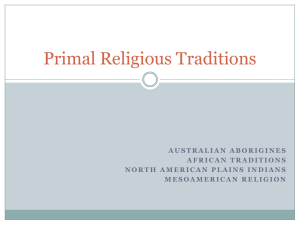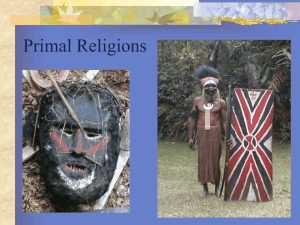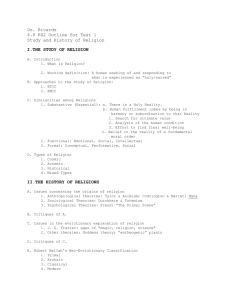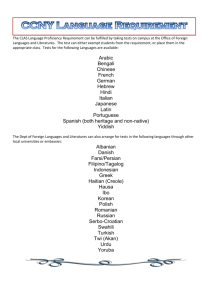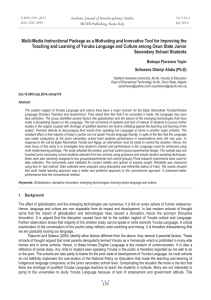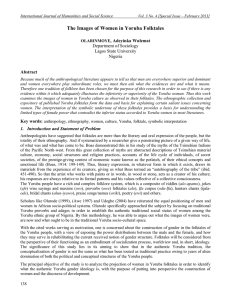Tribal Traditions
advertisement
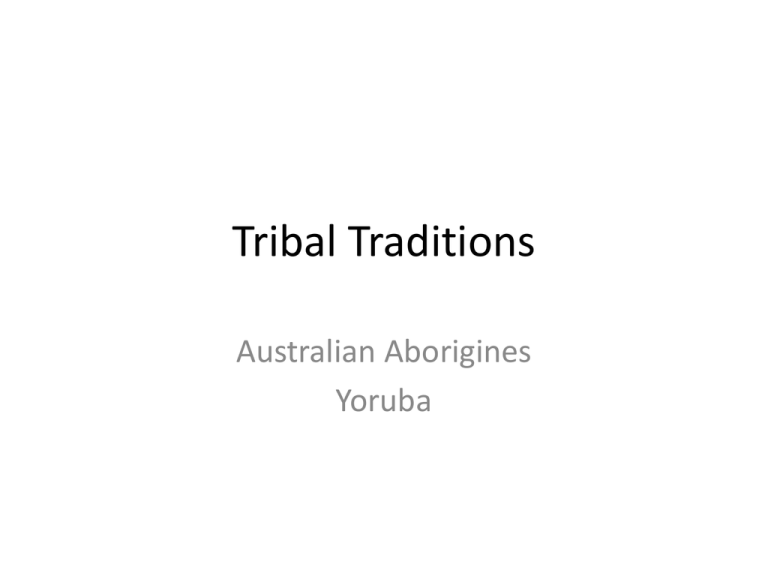
Tribal Traditions Australian Aborigines Yoruba Why Study Primal Religions? • We study “primal” traditions for 2 reasons: 1. Primal religions provide insight into the mythic and ritual dimension of religion 2. Primal religions are the source from which all the world’s religions have sprung. Groups we will look at Australian Aborigines, Yoruba, Plains Indians of North America, Aztecs What characterizes a Primal Religion? • Primal religions today are generally practiced by people of oral (non-literate) cultures. – Non-literate people means that they do not depend on scriptures or written teachings – What they lack in written texts, they make up for in oral material- myths or stories that are passed down from generation to generation • Primal religions tend to be traditions practiced by – Tribal peoples who live in villages – BUT, they are also practiced by city dwellers such as • Modern Yoruba • Ancient Aztecs Autralian Aborigines: The Dreaming • The foundation of Aboriginal religion is the concept of the Dreaming: Devil’s Marbles • The world was originally formless. • Supernatural beings called Ancestors emerged and roamed about the earth. • The Ancestors gave shape to the landscape and created the various forms of life, including the first human beings. • The Ancestors organized humans into tribes, specified the territory each tribe was to occupy, and determined each tribe’s language, social rules and customs. Great power is said to be found below the sacred places left behind by the Ancestors. Prior to a baby’s birth, the mother is to visit a sacred place so her baby will receive spiritual essence Near Wauchope North of Sydney Australia Totem • Each Aborigine is a living representation of an Ancestor. • This relationship is symbolized by a totem – The natural form in which the Ancestor appeared in the Dreaming (or vision) – Is decorated with pictures of spirits, often in the form of animals • An individual will always be identified in certain ways with the Ancestor. • A totem pole showed a family’s importance and power. They were also a way of remembering the dead. • Totem poles could be more than 40 feet high. Taboo Taboos dictate who can do what and when when it comes to ritual practice: A taboo usually orders society through its rules Determines who may and may not: participate in certain activities handle certain objects contains punishments for those who violate these boundaries Examples: from other faiths – Only priests may consecrate Eucharist (Christianity) – Men must not touch Women during menstruation and right after childbirth (Judaism) – Only priests can tell your future (Yoruba) Initiation Rites in Tribal faiths • The power of myth, and the performance of ritual to re-enact myth, are basic features of all primal traditions. • The purpose of the initiation rituals awaken young people to this spiritual identity, and at the same time redefine their social identity within the tribe. – Initiation rituals (see hw) An African Tradition: the Religion of the Yoruba • Africa – the second largest continent in terms of landmass – home to some four hundred million people and several hundred religions • including the religion of the Yoruba. • PURPOSE • The purpose of the Yoruba religion: – maintain the balance between the human beings of earth and the gods and ancestors of heaven while guarding against the evil deeds of sorcerers and witches • Yoruba sees reality as being divided into two separate worlds: heaven and earth Heaven – Invisible home of the gods and the ancestors • Earth – Ordinary world, visible home of human beings, descended from the gods – Populated by perverted form of human beings, witches and sorcerers, who can cause disastrous harm if not controlled Yoruba Cosmology Gods and Ancestors • Primal traditions hold a belief in both a supreme god and a host of less powerful deities. • The supreme god of the Yoruba is Olorun • The many deities of the Yoruba worship are known as orishas • The supreme god, lesser deities, and ancestors all inhabit heaven Divination • Divination is an extremely important aspect of Yoruba religion because knowledge of one’s future is considered essential for determining how to proceed with one’s life. • The procedure for divination requires the diviners to memorize hundreds of Wisdom stories • the diviner recites the appropriate story for each person who asks for divination • Diviners add a ritual aspect – wearing a mask, special clothing/ using implements Sangoma diviners, Botswana Yoruba Ritual • Several types of ritual practitioners mediate between the gods and ancestors in heaven and the human beings on earth • For example: when someone dies, a ritual specialist mediates between the ancestors and the living – Wearing ceremonial masks and costumes – this specialist becomes a living representation of an ancestor by dancing at festivals – When an important person dies • The specialist imitates that persons • The specialist conveys comforting messages from the deceased to the living.
